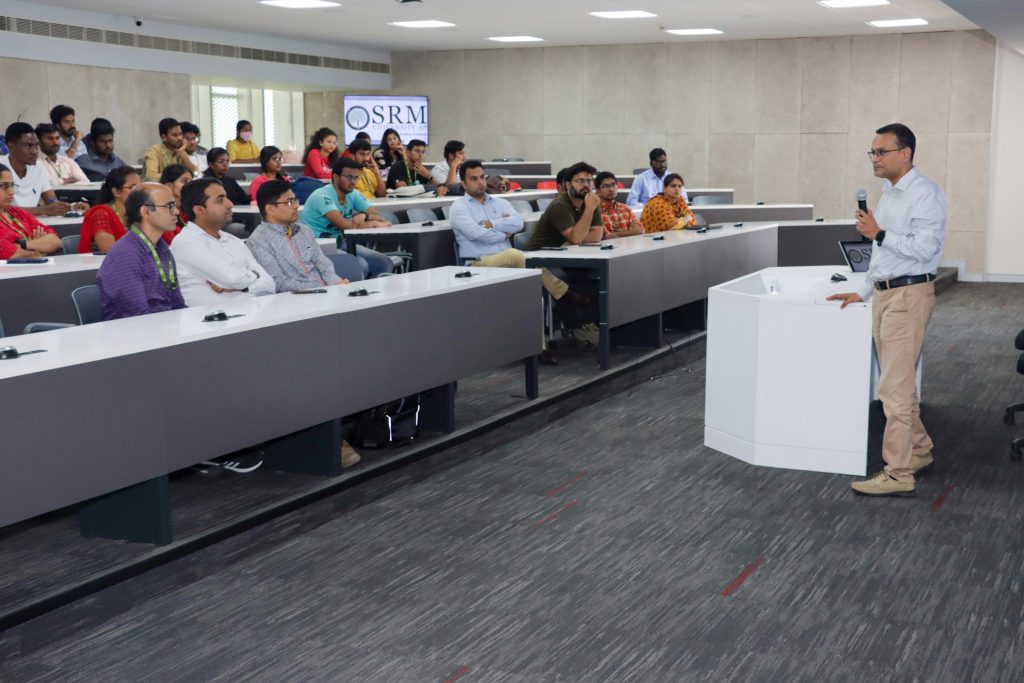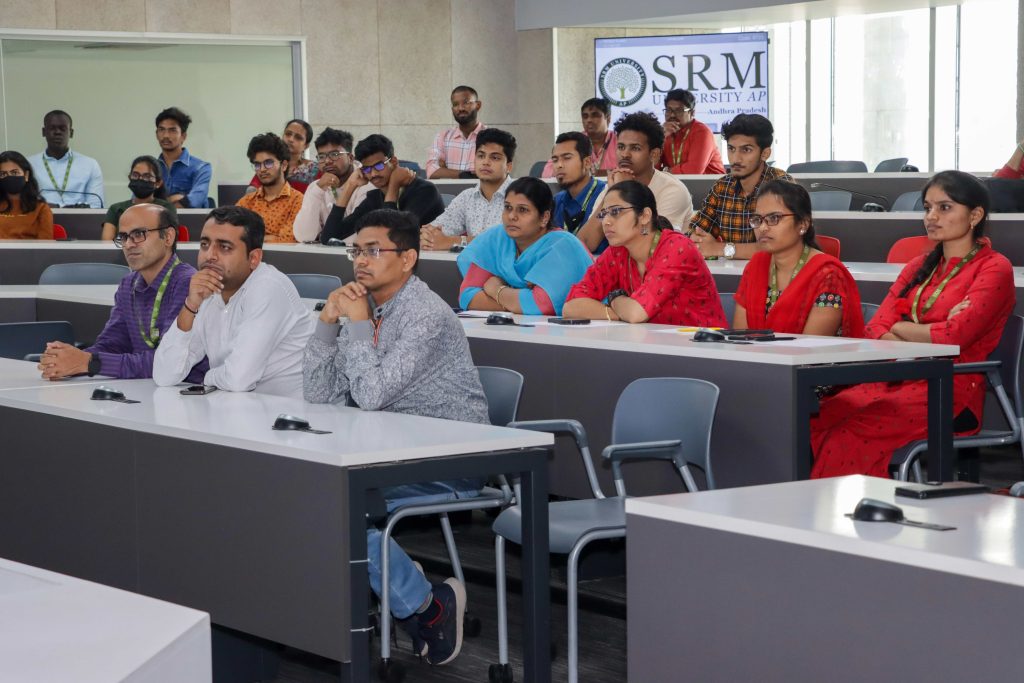Recent News
- Advances in Electric Vehicle Technology: A Study on Bi-Directional Converters March 12, 2024
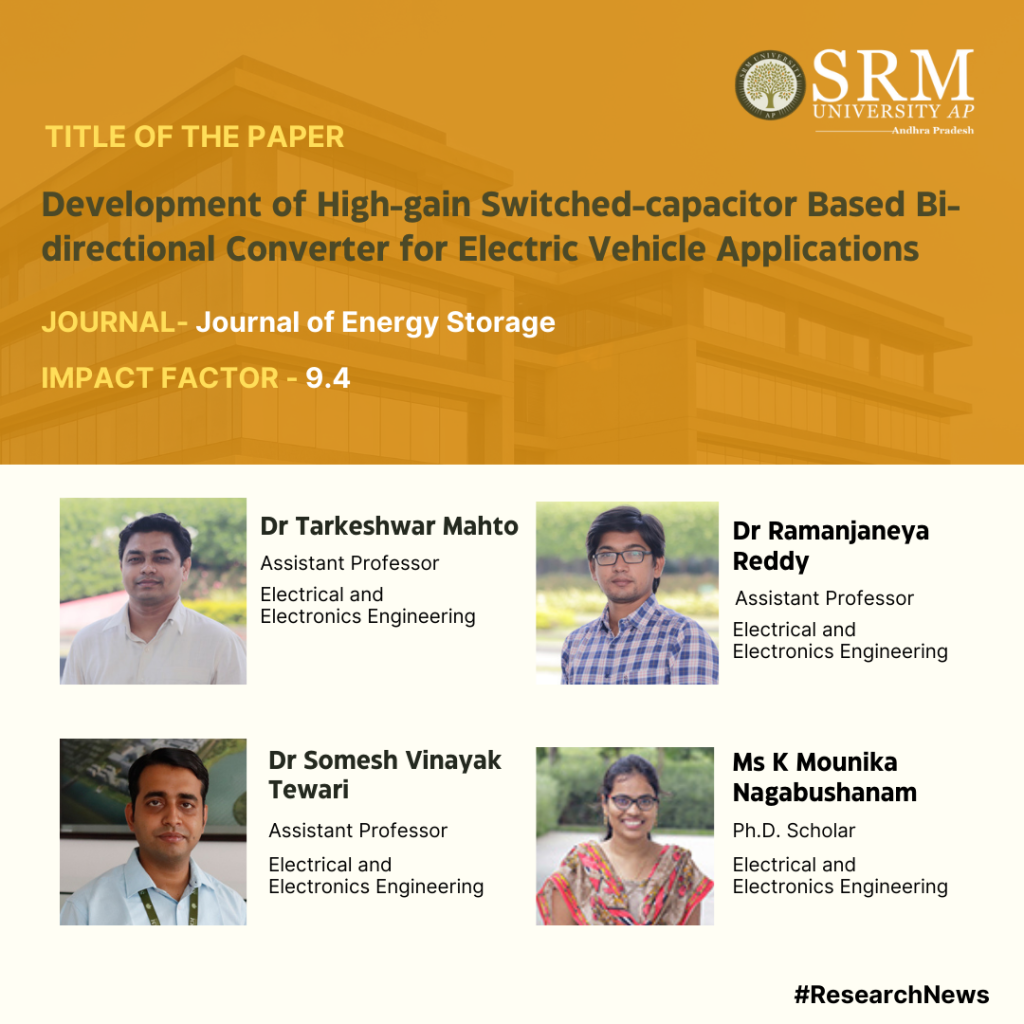
Electric Vehicles are in vogue today, thanks to the heightened environmental concerns, greater availability of models, increased cost competitiveness and improved vehicle ranges. To contribute to the growing field of electric vehicle technology, Assistant Professors, Dr Tarkeshwar Mahto, Dr Somesh Vinayak Tewari and Dr Ramanjaneya Reddy from the Department of Electrical and Electronics Engineering at SRM University-AP along with the research scholar, Ms K Mounika Nagabushanam, conducted a study and published a research paper titled “Development of High-Gain Switched-Capacitor Based Bi-Directional Converter for Electric Vehicle Applications.” The team’s research focuses on creating a bi-directional DC-DC converter that enables power flow from the battery to the motor and vice versa while maintaining necessary voltage gains and ensuring improved efficiency and low cost.
Abstract
High efficiency, high voltage transfer ratio (VTR), and low input ripple current are required in any bidirectional DC-DC converter (BDC) that plays a major role in interfacing batteries in applications like DC microgrids and electric vehicles (EVs). To meet these requirements, a switched capacitor-based BDC is proposed to interface the battery with a propulsion system via a DC Link. It has a simple circuit with only a set of switching operations, High VTR, and lesser ripple current on the low voltage (LV) side, which are advantages of the proposed High Gain Switched-Capacitor Bi-directional DC-DC Converter (SC-BDC), making it appropriate for use in EVs. The steady-state analysis, design consideration of passive components, loss and efficiency analysis are presented. Finally, the proposed High Gain SC-BDC is compared with a few of the existing BDCs in the literature. The feasibility of the converter was demonstrated by simulating a 200 W converter and validating results produced in a MATLAB environment.
Practical implementation of your research or the social implications associated with it.
The developed converter can be used in Electric Vehicle for integration of battery to traction motor.
Collaborations.
1. Majed A. Alotaibi, Department of Electrical Engineering, College of Engineering, King Saud University, 11421, Saudi Arabia.
2. Hasmat Malik, Department of Electrical Power Engineering, Faculty of Electrical Engineering, University Technology Malaysia (UTM), Johor Bahru 81310, Malaysia.
3. Fausto Pedro García Márquez, Ingenium Research Group, Universidad Castilla-La Mancha, 13071 Ciudad Real, Spain.
As part of their future research plans the team plans of working on noise reduction methods that are brought on by regeneration action and to incorporate various control techniques to keep the DC link voltage of the propulsion system constant.
We wish the team all success in their future endevours!
Continue reading →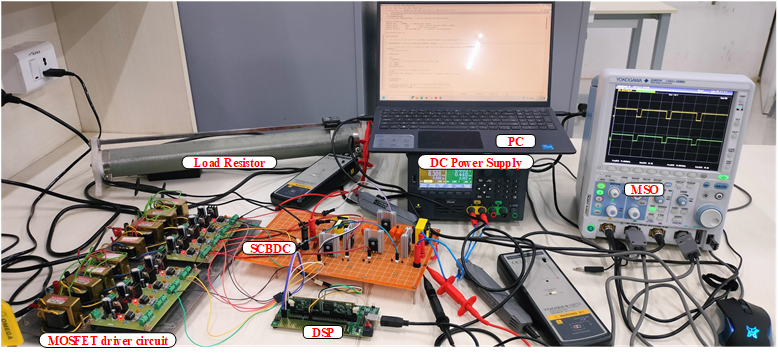
- Elected as General Secretary of ACDOS NMO-IFAC July 11, 2023
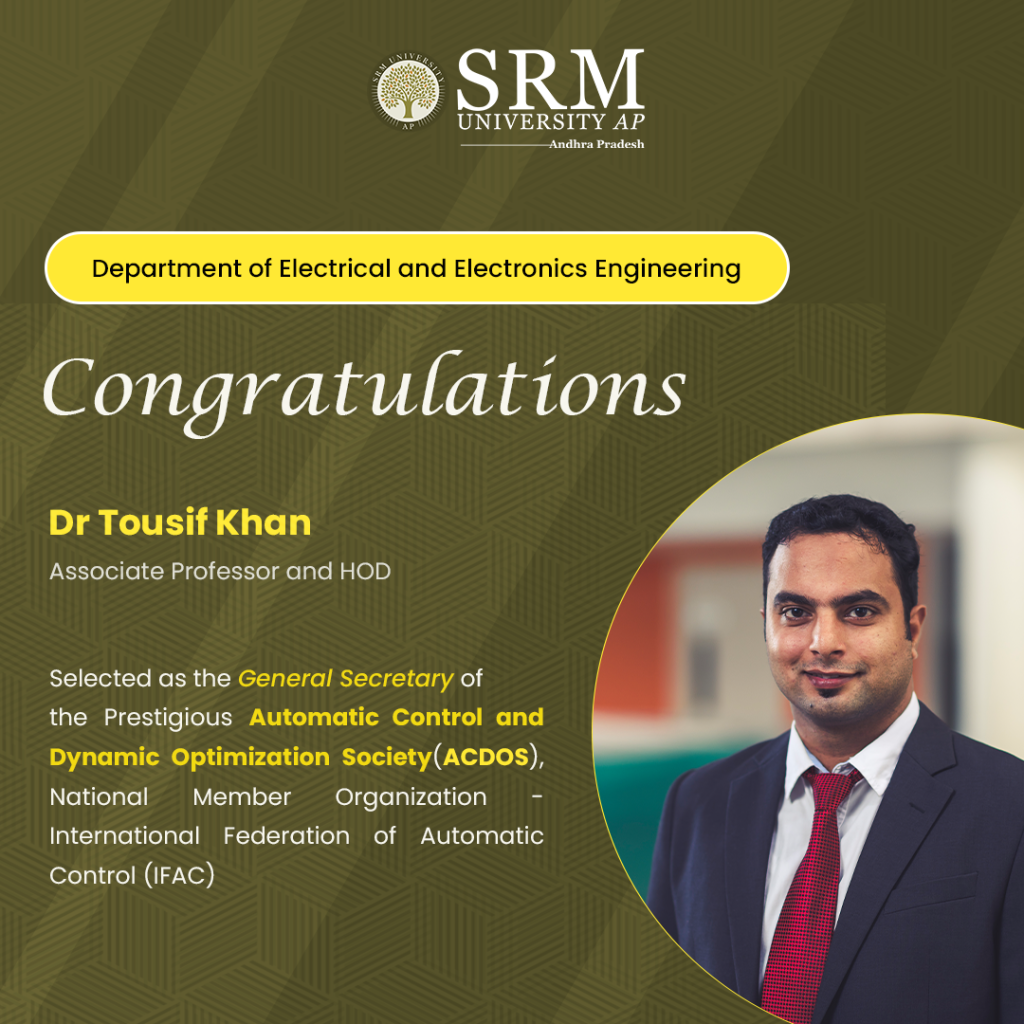
The Department of Electrical and Electronics Engineering is glad to announce that Dr Tousif Khan, Associate Professor and HOD, has been selected as the General Secretary of the Prestigious Automatic Control and Dynamic Optimization Society (ACDOS), National Member Organisation of the International Federation of Automatic Control (IFAC), at the Governing Council meeting held on June 22, 2023.
Automatic Control & Dynamic Optimization Society (ACDOS) was established in 2011 with the noble objective to promote automatic control and dynamic optimization discipline in academia and industry across India. The society aims to host international conferences and technical workshops regularly in order to promote close interaction between industry and academia. The society also participates in curriculum development for graduate and undergraduate studies and facilitates productive research in this field. The society also volunteers to honour eminent persons who excelled in this field in industry and academic circles.
Congratulations to Dr Tousif for this remarkable accomplishment and for further contributing to the university’s rising reputation among national and international frontiers!
Continue reading → - EEE students venture into Entrepreneurship June 6, 2023
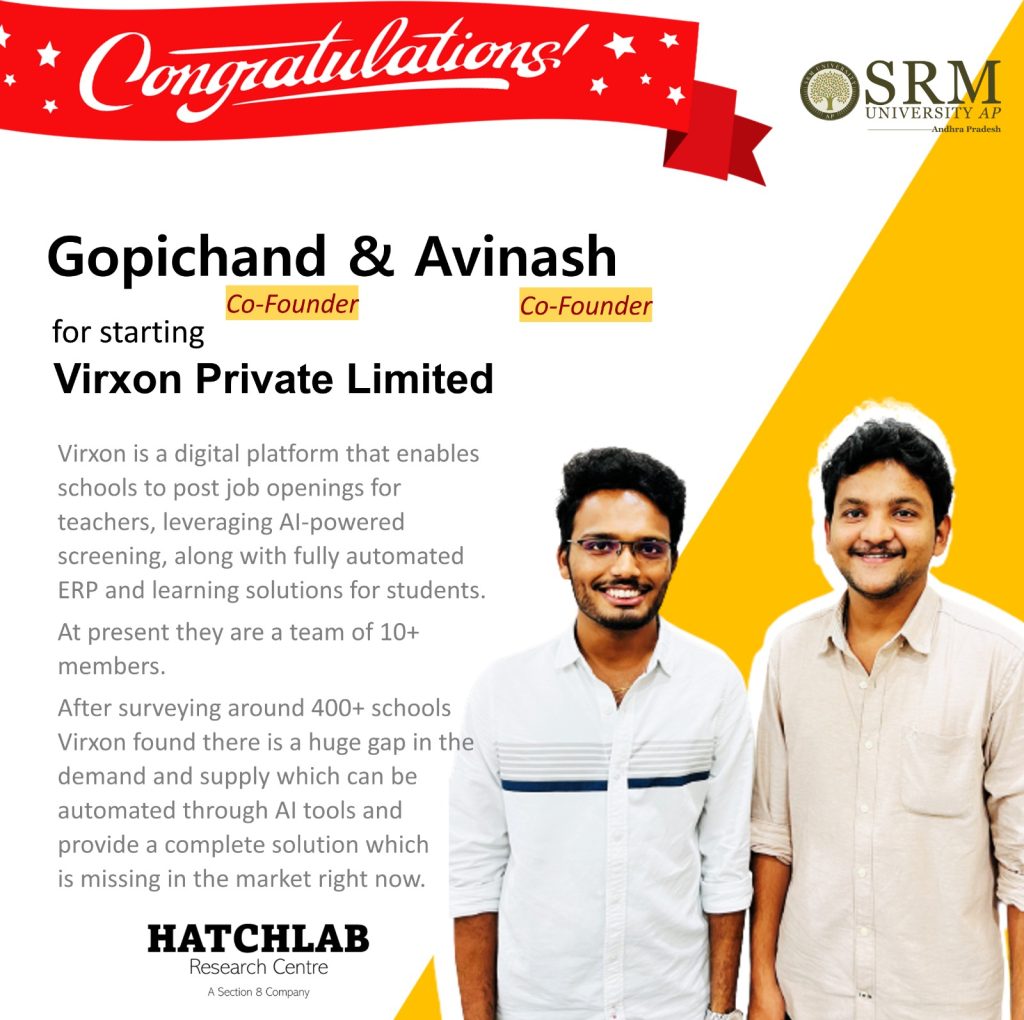
HatchLab Research Centre, SRM University-AP aims at facilitating a conducive atmosphere where all types of businesses can grow and prosper especially in a socially backward place. Hatchlab has helped in developing multiple projects, but here’s a unique venture by fourth year
Electrical and Electronics Engineering students, Gopichand and Avinash.Whilst the rest of their batch mates are awaiting lucrative offers from top-tech companies, this duo has decided to venture into Entrepreneurship. Gopichand and Avinash, despite societal pressure, have decided to live their dreams and co-founded Virxon Private Limited. These final year engineering students have developed an AI-based digital platform that would enable schools to post job openings for teachers, along with fully automated ERP and learning solutions for students. After surveying around 400+ schools. Virxon found that, there is a huge gap in the demand and supply which can be automated through AI tools and provide a complete solution which is missing in the market right now.
Thrilled about their decision of swimming against the tide to choose a rather difficult path, these entrepreneur duo said -“It may appear that we might be slogging for 18 hours, and stay awake till 2 am in the morning, balancing our studies and our aspirations, but that is not the case. Our dreams keep us awake and our goals keep us going. We are definitely going to make a difference in society.”
Currently, the students are being mentored on the business model and the marketing strategies by Mr. Jayaprakash Narayan, from HatchLab Research Centre, SRM University- AP.
Continue reading → - Agricultural Utility Vehicle: Patent Granted to Inventors from the Department of EEE April 19, 2023
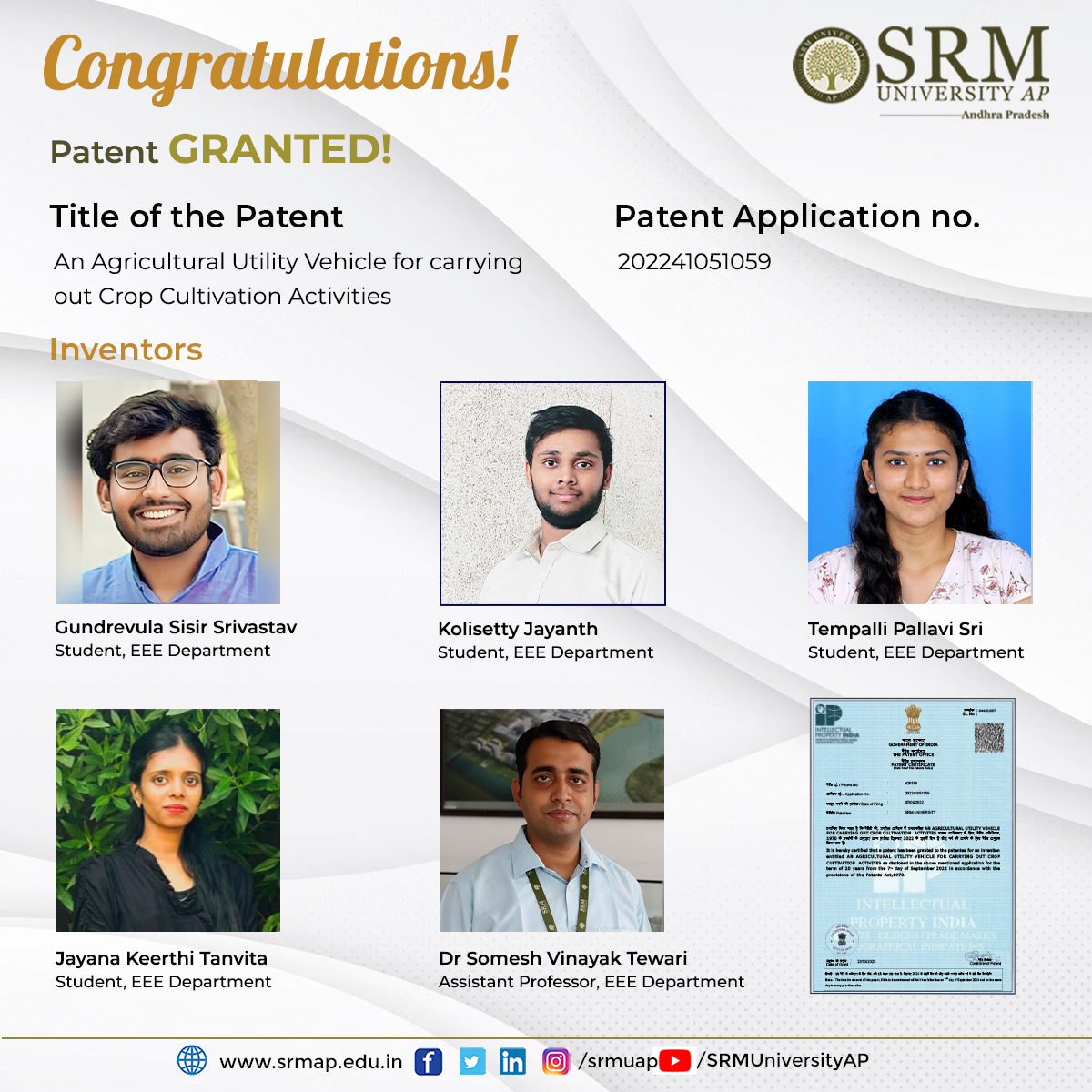 Conventional agricultural utility vehicles used for crop cultivation involve complex operations such as ploughing and seeding, require trained personnel, and are expensive and not affordable to many farmers, especially in developing countries. Thus, there is a need for an agricultural utility vehicle for carrying out crop cultivation activities that alleviate the drawbacks of conventional practices.
Conventional agricultural utility vehicles used for crop cultivation involve complex operations such as ploughing and seeding, require trained personnel, and are expensive and not affordable to many farmers, especially in developing countries. Thus, there is a need for an agricultural utility vehicle for carrying out crop cultivation activities that alleviate the drawbacks of conventional practices.Researchers at the Department of Electrical and Electronics Engineering have been granted a patent for an invention entitled An Agricultural Utility Vehicle for Crop Cultivation Activities (Application number 202241051059). Assistant Professor Dr Somesh Vinayak Tewari and his students Gundrevula Sisir Srivastav, Kolisetty Jayanth, Tempalli Pallavi Sri, and Jayana Keerthi Tanvita have accomplished this milestone through their dedicated research.
Abstract
The present disclosure discloses an agricultural utility vehicle (1000) for carrying out crop cultivation activities comprising a framed structure (200) having wheels configured to be driven in an open plot of land. An agricultural implement (400) is configured to be attached to the vehicle. An electric drive system (100) is configured to drive the framed structure, and a battery (300) is coupled to the electric drive system to provide power.
Continue reading → - Electrical Engineering – Your Way Forward! February 14, 2023
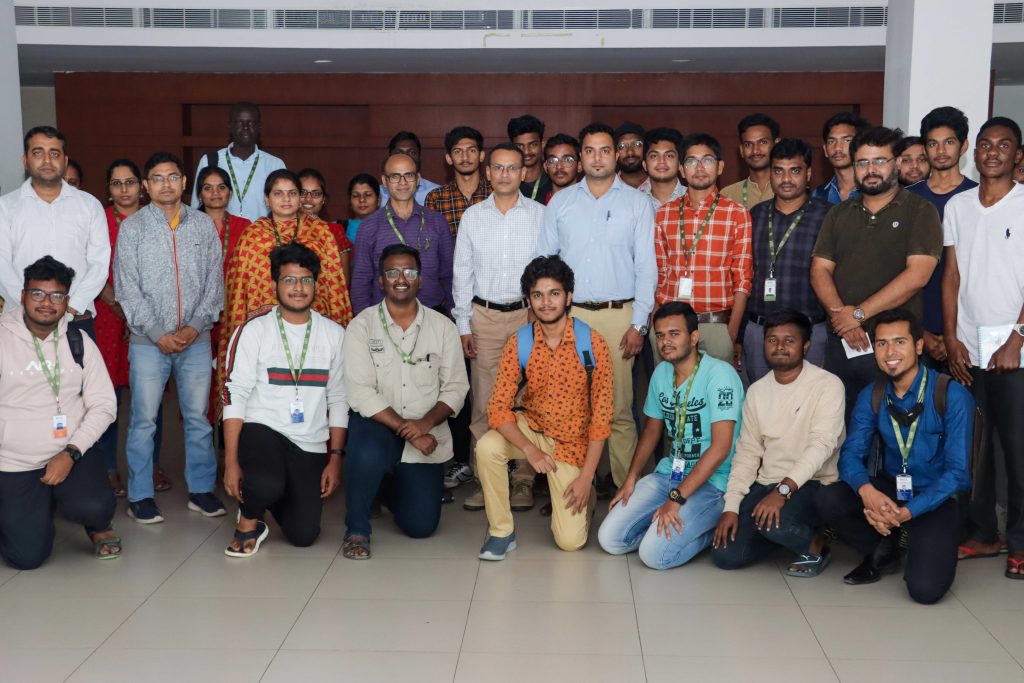
Electrical and Electronic Engineering is a core engineering course in the market with an aspiring number of students securing admissions to reputed universities. Yet with the advent of the modern software era, the dilemma of future job opportunities for Electrical Engineers has been buzzing around the students of the field. The Power & Control Society, Department of Electrical and Electronic Engineering organised an invited talk on February 02, 2023, on “Career Opportunities for Electrical Engineers” to empower and enlighten young graduates on potential career prospects in the field. Prof. Praveen Kumar of Electrical Engineering, Indian Institute of Technology, Guwahati was the distinguished speaker of the session.
Some of the frequently asked questions among Electrical Engineers are whether selecting Electrical Engineering as a core course instead of other engineering streams for their BTech degree was the right choice and whether it would hinder their career opportunities in this ever- transitioning job market. Nowadays, the engineering field is dominated by software and its application. It is quite evident that most jobs lie in the software or IT sectors, focusing more on coding and programming instead of our core streams.
Prof. Praveen Kumar addressed this pressing situation and reassured students that selecting the EEE stream was the right choice with it being an important core stream in the field of Engineering and giving flavour to understanding the physics behind the engineering model. He has addressed with examples of how such knowledge plays a major role when relating to other fields in any sector of the industry whether in assembling, production, AI, innovation etc. Prof. Kumar talked about coding and programming, reading syntax, and explained the importance of AI today, and how it plays an important role in engineering analysis such as Control theory, Electrical machines, Power electronics, Power systems etc. Prof. Kumar also highlighted different aspects of the transformation of the Nationwide EV ecosystem in India and encouraged students to learn various aspects of EV and solutions – To think and analyse the problem to create, innovate and present solutions per the market trend.
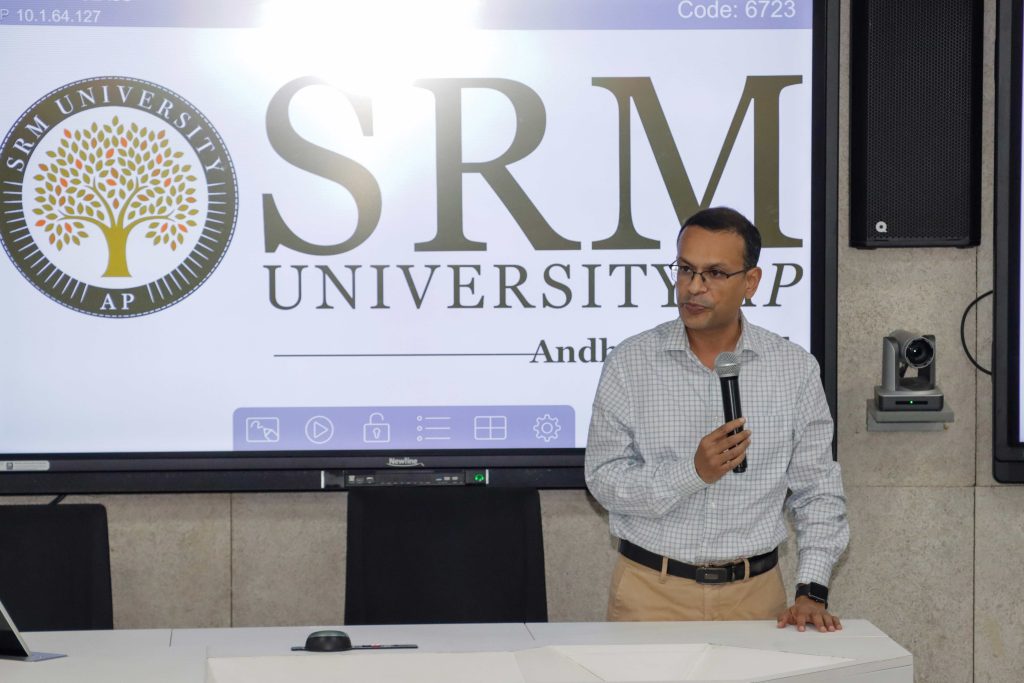
About the Speaker
A distinguished academician from the Indian Institute of Technology, Guwahati, Professor Praveen Kumar had completed his MTech from the Indian Institute of Technology, New Delhi. He was conferred with PhD from the Delft University of Technology, The Netherlands and is an expert in the fields of Electric Vehicles, Wireless Power Transmission and Electrical Machines.
Continue reading →


